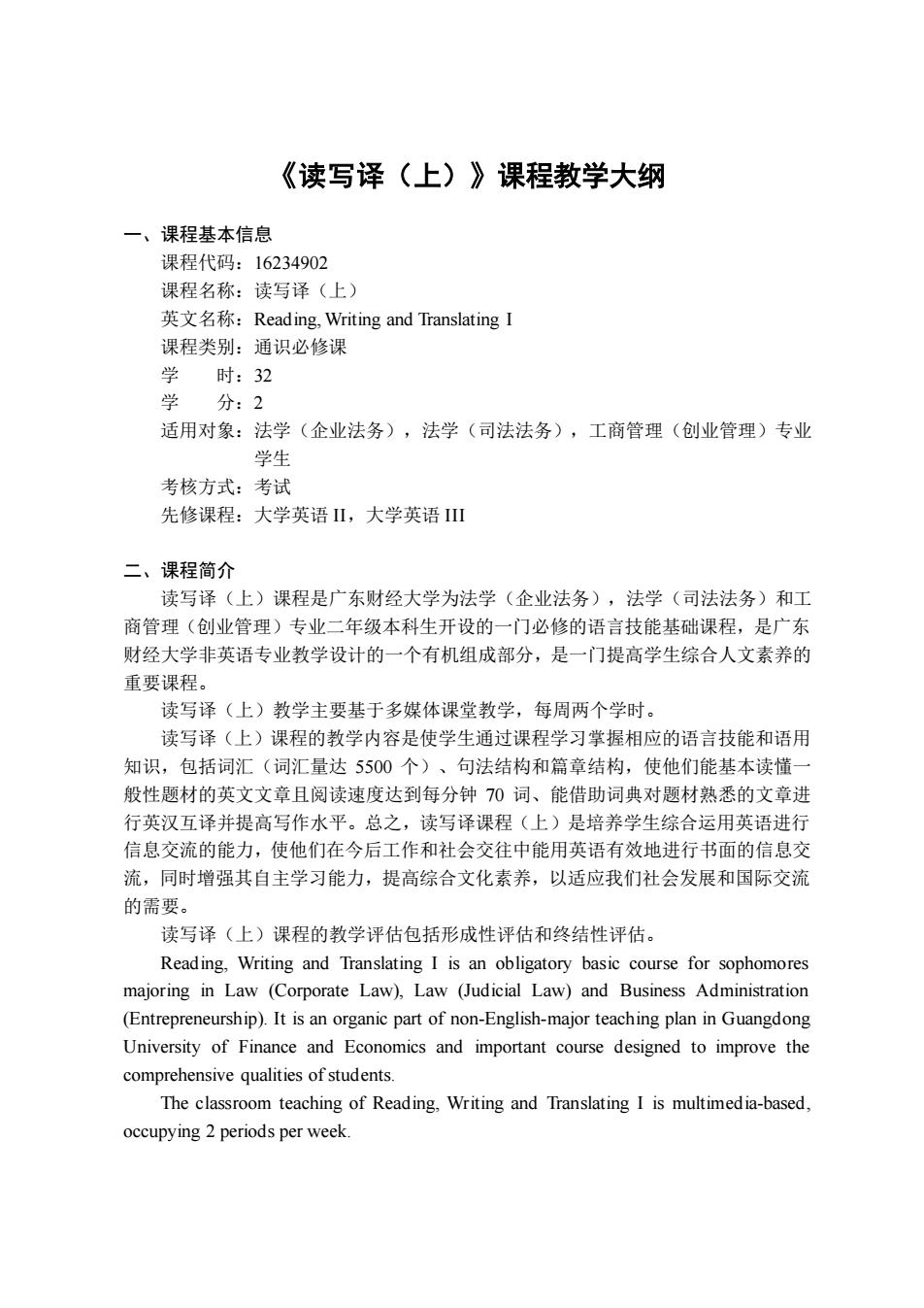
《读写译(上)》课程教学大纲 一、课程基本信息 课程代码:16234902 课程名称:读写译(上) 英文名称:Reading,.Writing and Translating I 课程类别:通识必修课 时:32 学 分:2 适用对象:法学(企业法务),法学(司法法务),工商管理(创业管理)专业 学生 考核方式:考试 先修课程:大学英语Ⅱ,大学英语山 二、课程简介 读写译(上)课程是广东财经大学为法学(企业法务),法学(司法法务)和工 商管理(创业管理)专业二年级本科生开设的一门必修的语言技能基础课程,是广东 财经大学非英语专业教学设计的一个有机组成部分,是一门提高学生综合人文素养的 重要课程。 读写译(上)教学主要基于多媒体课堂教学,每周两个学时。 读写译(上)课程的教学内容是使学生通过课程学习掌握相应的语言技能和语用 知识,包括词汇(词汇量达5500个)、句法结构和篇章结构,使他们能基本读懂 般性题材的英文文章且阅读速度达到每分钟70词、能借助词典对题材熟悉的文章进 行英汉互译并提高写作水平。总之,读写译课程(上)是培养学生综合运用英语进行 信息交流的能力,使他们在今后工作和社会交往中能用英语有效地进行书面的信息交 流,同时增强其自主学习能力,提高综合文化素养,以适应我们社会发展和国际交流 的需要。 读写译(上)课程的教学评估包括形成性评估和终结性评估。 Reading,Writing and Translating I is an obligatory basic course for sophomores majoring in Law (Corporate Law),Law (Judicial Law)and Business Administration (Entrepreneurship).It is an organic part of non-English-major teaching plan in Guangdong University of Finance and Economics and important course designed to improve the comprehensive qualities of students. The classroom teaching of Reading.Writing and Translating I is multimedia-based, occupying 2 periods per week
《读写译(上)》课程教学大纲 一、课程基本信息 课程代码:16234902 课程名称:读写译(上) 英文名称:Reading, Writing and Translating I 课程类别:通识必修课 学 时:32 学 分:2 适用对象:法学(企业法务),法学(司法法务),工商管理(创业管理)专业 学生 考核方式:考试 先修课程:大学英语 II,大学英语 III 二、课程简介 读写译(上)课程是广东财经大学为法学(企业法务),法学(司法法务)和工 商管理(创业管理)专业二年级本科生开设的一门必修的语言技能基础课程,是广东 财经大学非英语专业教学设计的一个有机组成部分,是一门提高学生综合人文素养的 重要课程。 读写译(上)教学主要基于多媒体课堂教学,每周两个学时。 读写译(上)课程的教学内容是使学生通过课程学习掌握相应的语言技能和语用 知识,包括词汇(词汇量达 5500 个)、句法结构和篇章结构,使他们能基本读懂一 般性题材的英文文章且阅读速度达到每分钟 70 词、能借助词典对题材熟悉的文章进 行英汉互译并提高写作水平。总之,读写译课程(上)是培养学生综合运用英语进行 信息交流的能力,使他们在今后工作和社会交往中能用英语有效地进行书面的信息交 流,同时增强其自主学习能力,提高综合文化素养,以适应我们社会发展和国际交流 的需要。 读写译(上)课程的教学评估包括形成性评估和终结性评估。 Reading, Writing and Translating I is an obligatory basic course for sophomores majoring in Law (Corporate Law), Law (Judicial Law) and Business Administration (Entrepreneurship). It is an organic part of non-English-major teaching plan in Guangdong University of Finance and Economics and important course designed to improve the comprehensive qualities of students. The classroom teaching of Reading, Writing and Translating I is multimedia-based, occupying 2 periods per week

Through integrated course,Reading.Writing and Translating I aims to develop students'abilities to master corresponding language and pragmatic knowledge,including vocabulary (about 5500 words),syntactic structure and discourse structure;to understand English articles on general topics at a reading speed of 70 words per minute and to translate essays on familiar topics from English into Chinese and vice versa with the help of dictionaries and enhance their writing levels.In a word this course aims to develop students'ability to use English in an all-round way so that in their future work and social interactions they will be able to exchange information effectively in English,and at the same time they will be able to enhance their ability to study independently and improve their cultural quality so as to meet the needs of China's social development and intemational changes The evaluation of Reading,Writing and Translating I consists of formative assessment and summative assessment. 三、课程性质与教学目的 读写译(上)课程是广东财经大学本科学生课程设置的有机组成部分,是广东财 经大学法学(企业法务),法学(司法法务)和工商管理(创业管理)专业本科生 门必修的公共基础课。它是以英语语言知识与应用技能、学习策略和跨文化交际为主 要内容,以外语教学理论为指导并集多种教学模式和教学手段为一体的教学体系。 读写译(上)的实质是通过大量的主要以阅读形式为主的语料素材的输入,使学 生学习掌握相应的语言知识,如词汇的语言、语义、词法、句子的句法等等,以及这 些知识在准真实语境中是如何使用的有关语用知识,如文化背景知识、语境等等,从 而培养起学生读、写、译综合运用英语进行信息交流的能力(即达到教学大纲的要求), 并在此过程中培养学生良好的学习习惯,帮助学生寻求合理的学习策略,掌握正确的 学习方法,增强学生自主学习能力和合作精神,使他们毕业后能在工作和社会交往中 运用英语有效地进行书面的信息交流。 通过读写译课程的学习,学生应达到如下具体目标:具有自主学习能力:能读懂 大学英语四级阅读教材和难度相当的各种题材和体裁的文章:能基本读懂国内的英文 书刊,掌握主要意思和能容:能就不同的阅读材料使用有效的阅读技巧:能写出结构 完整、罗组清晰、意思连贯、用词恰当的短文:能比较有效地使用各种写作技巧来展 开论述:能借助词典对题材熟悉的文章进行英汉互译且译文基本流畅:具有一定的使 用文献的能力,如上网查阅感兴趣的英语资料和有效利用图书馆:能定期进行自主评 价、自主策划、组织和实施各种语言实践:能定期进行合作学习并进行同学间的相互 评价;具有良好的跨文化意识和世界意识。培养学生的思辨能力和批判性思维,确立 正确的世界观和价值观,加强爱国主义教育,学会使用英语说好中国故事
Through integrated course, Reading, Writing and Translating I aims to develop students’ abilities to master corresponding language and pragmatic knowledge, including vocabulary (about 5500 words), syntactic structure and discourse structure; to understand English articles on general topics at a reading speed of 70 words per minute and to translate essays on familiar topics from English into Chinese and vice versa with the help of dictionaries and enhance their writing levels. In a word this course aims to develop students’ ability to use English in an all-round way so that in their future work and social interactions they will be able to exchange information effectively in English, and at the same time they will be able to enhance their ability to study independently and improve their cultural quality so as to meet the needs of China’s social development and international changes. The evaluation of Reading, Writing and Translating I consists of formative assessment and summative assessment. 三、课程性质与教学目的 读写译(上)课程是广东财经大学本科学生课程设置的有机组成部分,是广东财 经大学法学(企业法务),法学(司法法务)和工商管理(创业管理)专业本科生一 门必修的公共基础课。它是以英语语言知识与应用技能、学习策略和跨文化交际为主 要内容,以外语教学理论为指导并集多种教学模式和教学手段为一体的教学体系。 读写译(上)的实质是通过大量的主要以阅读形式为主的语料素材的输入,使学 生学习掌握相应的语言知识,如词汇的语言、语义、词法、句子的句法等等,以及这 些知识在准真实语境中是如何使用的有关语用知识,如文化背景知识、语境等等,从 而培养起学生读、写、译综合运用英语进行信息交流的能力(即达到教学大纲的要求), 并在此过程中培养学生良好的学习习惯,帮助学生寻求合理的学习策略,掌握正确的 学习方法,增强学生自主学习能力和合作精神,使他们毕业后能在工作和社会交往中 运用英语有效地进行书面的信息交流。 通过读写译课程的学习,学生应达到如下具体目标:具有自主学习能力;能读懂 大学英语四级阅读教材和难度相当的各种题材和体裁的文章;能基本读懂国内的英文 书刊,掌握主要意思和能容;能就不同的阅读材料使用有效的阅读技巧;能写出结构 完整、逻辑清晰、意思连贯、用词恰当的短文;能比较有效地使用各种写作技巧来展 开论述;能借助词典对题材熟悉的文章进行英汉互译且译文基本流畅;具有一定的使 用文献的能力,如上网查阅感兴趣的英语资料和有效利用图书馆;能定期进行自主评 价、自主策划、组织和实施各种语言实践;能定期进行合作学习并进行同学间的相互 评价;具有良好的跨文化意识和世界意识。培养学生的思辨能力和批判性思维,确立 正确的世界观和价值观,加强爱国主义教育,学会使用英语说好中国故事
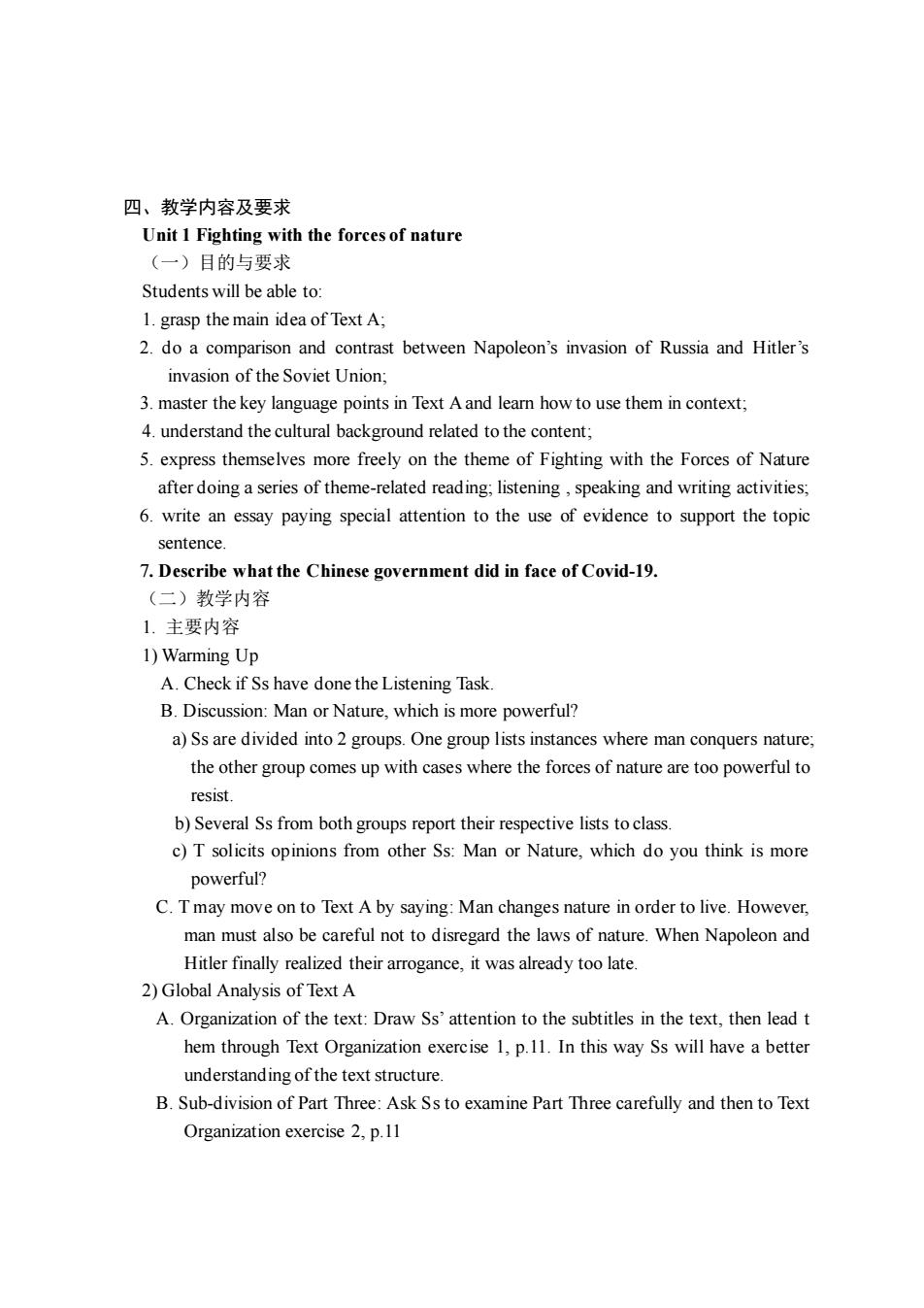
四、教学内容及要求 Unit 1 Fighting with the forces of nature (一)目的与要求 Students will be able to: 1.grasp the main idea of Text A; 2.do a comparison and contrast between Napoleon's invasion of Russia and Hitler's invasion of the Soviet Union: 3.master the key language points in Text Aand learn how to use them in context; 4.understand the cultural background related to the content; 5.express themselves more freely on the theme of Fighting with the Forces of Nature after doing a series of theme-related reading;listening,speaking and writing activities, 6.write an essay paying special attention to the use of evidence to support the topic sentence. 7.Describe what the Chinese government did in face of Covid-19. (二)教学内容 1.主要内容 1)Warming Up A.Check if Ss have done the Listening Task B.Discussion:Man or Nature,which is more powerful? a)Ss are divided into 2 groups.One group lists instances where man conquers nature. the other group comes up with cases where the forces of nature are too powerful to resist b)Several Ss from both groups report their respective lists to class. c)T solicits opinions from other Ss:Man or Nature,which do you think is more powerful? C.Tmay move on to Text A by saying:Man changes nature in order to live.However, man must also be careful not to disregard the laws of nature.When Napoleon and Hitler finally realized their arrogance,it was already too late 2)Global Analysis of Text A A.Organization of the text:Draw Ss'attention to the subtitles in the text,then lead t hem through Text Organization exercise 1,p.11.In this way Ss will have a better understanding of the text structure B.Sub-division of Part Three:Ask Ss to examine Part Three carefully and then to Text Organization exercise 2,p.11
四、教学内容及要求 Unit 1 Fighting with the forces of nature (一)目的与要求 Students will be able to: 1. grasp the main idea of Text A; 2. do a comparison and contrast between Napoleon’s invasion of Russia and Hitler’s invasion of the Soviet Union; 3. master the key language points in Text A and learn how to use them in context; 4. understand the cultural background related to the content; 5. express themselves more freely on the theme of Fighting with the Forces of Nature after doing a series of theme-related reading; listening , speaking and writing activities; 6. write an essay paying special attention to the use of evidence to support the topic sentence. 7. Describe what the Chinese government did in face of Covid-19. (二)教学内容 1. 主要内容 1) Warming Up A. Check if Ss have done the Listening Task. B. Discussion: Man or Nature, which is more powerful? a) Ss are divided into 2 groups. One group lists instances where man conquers nature; the other group comes up with cases where the forces of nature are too powerful to resist. b) Several Ss from both groups report their respective lists to class. c) T solicits opinions from other Ss: Man or Nature, which do you think is more powerful? C. T may move on to Text A by saying: Man changes nature in order to live. However, man must also be careful not to disregard the laws of nature. When Napoleon and Hitler finally realized their arrogance, it was already too late. 2) Global Analysis of Text A A. Organization of the text: Draw Ss’ attention to the subtitles in the text, then lead t hem through Text Organization exercise 1, p.11. In this way Ss will have a better understanding of the text structure. B. Sub-division of Part Three: Ask Ss to examine Part Three carefully and then to Text Organization exercise 2, p.11
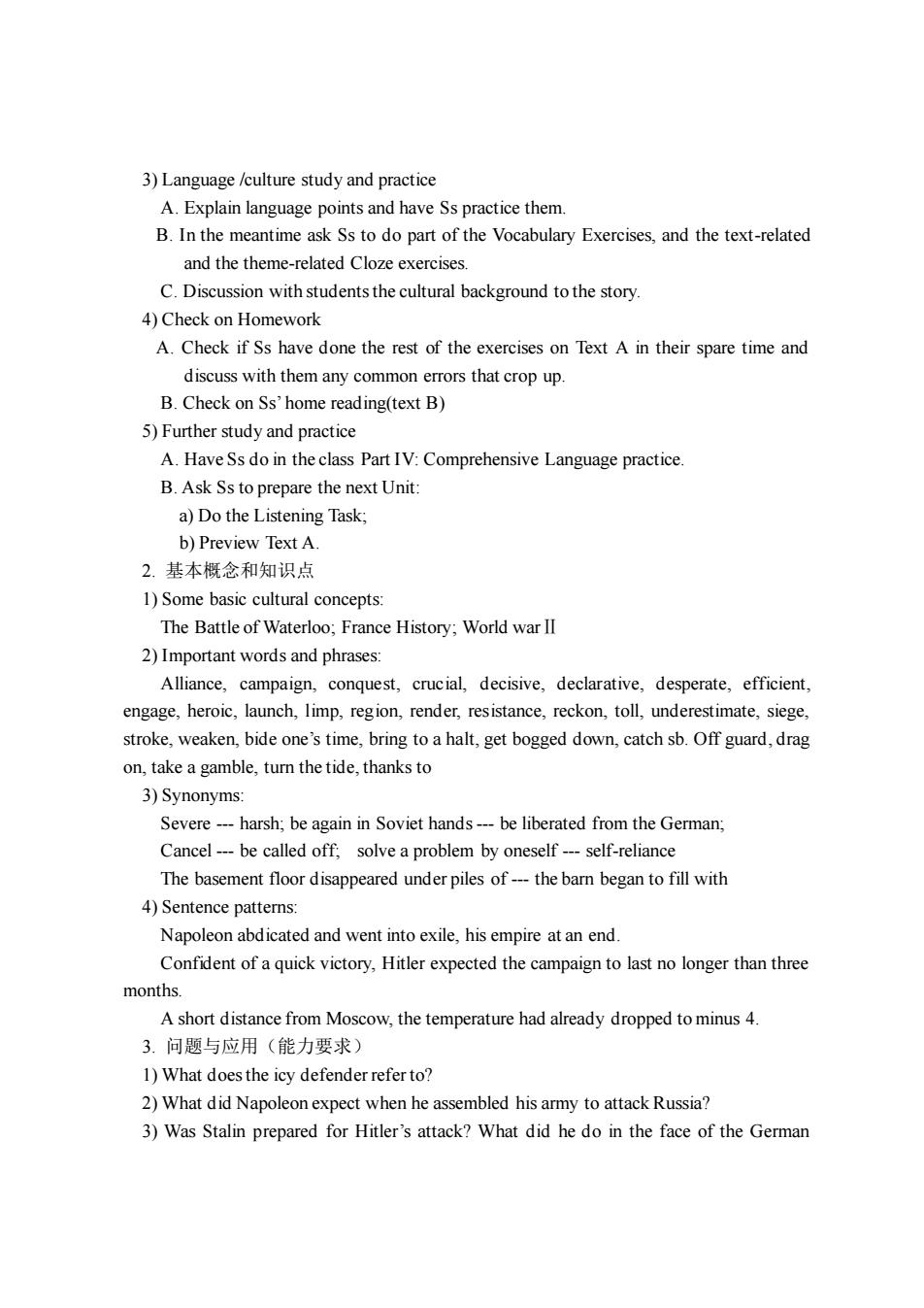
3)Language /culture study and practice A.Explain language points and have Ss practice them. B.In the meantime ask Ss to do part of the Vocabulary Exercises,and the text-related and the theme-related Cloze exercises. C.Discussion with students the cultural background to the story 4)Check on Homework A.Check if Ss have done the rest of the exercises on Text A in their spare time and discuss with them any common errors that crop up. B.Check on Ss'home reading(text B) 5)Further study and practice A.HaveSs do in the class Part IV:Comprehensive Language practice B.Ask Ss to prepare the next Unit: a)Do the Listening Task: b)Preview Text a 2.基本概念和知识点 1)Some basic cultural concepts: The Battle of Waterloo;France History;World war lI 2)Important words and phrases: Alliance,campaign,conquest,crucial,decisive,declarative,desperate,efficient, engage,heroic,launch,limp,region,render,resistance,reckon,toll,underestimate,siege, stroke.weaken,bide one's time,bring to a halt,get bogged down,catch sb.Off guard,drag on.take a gamble.turn the tide.thanks to 3)Synonyms: Severe--harsh;be again in Soviet hands--be liberated from the German Cancel-be called off,solve a problem by oneself-self-reliance The basement floor disappeared under piles of--the barn began to fill with 4)Sentence patterns: Napoleon abdicated and went into exile,his empire at an end. Confident of a quick victory,Hitler expected the campaign to last no longer than three months. A short distance from Moscow,the temperature had already dropped to minus 4. 3.问题与应用(能力要求) 1)What does the icy defender refer to? 2)What did Napoleonexpect when he assembled his army to attack Russia? 3)Was Stalin prepared for Hitler's attack?What did he do in the face of the German
3) Language /culture study and practice A. Explain language points and have Ss practice them. B. In the meantime ask Ss to do part of the Vocabulary Exercises, and the text-related and the theme-related Cloze exercises. C. Discussion with students the cultural background to the story. 4) Check on Homework A. Check if Ss have done the rest of the exercises on Text A in their spare time and discuss with them any common errors that crop up. B. Check on Ss’ home reading(text B) 5) Further study and practice A. Have Ss do in the class Part IV: Comprehensive Language practice. B. Ask Ss to prepare the next Unit: a) Do the Listening Task; b) Preview Text A. 2. 基本概念和知识点 1) Some basic cultural concepts: The Battle of Waterloo; France History; World warⅡ 2) Important words and phrases: Alliance, campaign, conquest, crucial, decisive, declarative, desperate, efficient, engage, heroic, launch, limp, region, render, resistance, reckon, toll, underestimate, siege, stroke, weaken, bide one’s time, bring to a halt, get bogged down, catch sb. Off guard, drag on, take a gamble, turn the tide, thanks to 3) Synonyms: Severe --- harsh; be again in Soviet hands --- be liberated from the German; Cancel --- be called off; solve a problem by oneself --- self-reliance The basement floor disappeared under piles of --- the barn began to fill with 4) Sentence patterns: Napoleon abdicated and went into exile, his empire at an end. Confident of a quick victory, Hitler expected the campaign to last no longer than three months. A short distance from Moscow, the temperature had already dropped to minus 4. 3. 问题与应用(能力要求) 1) What does the icy defender refer to? 2) What did Napoleon expect when he assembled his army to attack Russia? 3) Was Stalin prepared for Hitler’s attack? What did he do in the face of the German

invasion? 4)What was the significance of the battle of Stalingrad? 5)What conclusion does the author draw from Napoleon's and Hitler's military campaign? (三)思考与实践 1.Translating sentences 2.Translating passages 3.Essay writing: Write an essay entitled "protect Nature,Protect ourselves".The following points should be included:the importance of nature in our daily life;how to protect nature and make it serve us. (四)教学方法与手段 课堂教授,课堂讨论,多媒体,网络学习,自主学习 Unit 2 Smart Cars (一)目的与要求 Students will be able to 1.understand the main idea of Text A; 2.employ a variety of techniques in expository writing(definition,quotes,a mixtures of facts and opinions,etc.). 3.master the key language points in Text Aand leam how to use them in context: 4.understand the cultural background related to the content: 5.express themselves more freely on the theme of Smart cars after doing a series of theme-related reading.listening,speaking and writing activities: 6.write a resume (二)教学内容 1.主要内容 1)Warming Up A.Check if Ss have done the Listening Task. B.Free writing a)Ss are given 10 minutes to free write,beginning with the sentence:"Even ifI could afford acar,I may not actually want to drive one because..." b)Ss exchange their papers with at least three fellow Ss,noting down reasons given by the others as to why they wouldn't drive a car. c)T asks several Ss to report the class the reasons given for not driving a car
invasion? 4) What was the significance of the battle of Stalingrad? 5) What conclusion does the author draw from Napoleon’s and Hitler’s military campaign? (三)思考与实践 1. Translating sentences 2. Translating passages 3. Essay writing: Write an essay entitled “protect Nature, Protect ourselves”. The following points should be included: the importance of nature in our daily life; how to protect nature and make it serve us. (四)教学方法与手段 课堂教授,课堂讨论,多媒体,网络学习,自主学习 Unit 2 Smart Cars (一)目的与要求 Students will be able to: 1. understand the main idea of Text A; 2. employ a variety of techniques in expository writing(definition, quotes, a mixtures of facts and opinions, etc.); 3. master the key language points in Text A and learn how to use them in context; 4. understand the cultural background related to the content; 5. express themselves more freely on the theme of Smart cars after doing a series of theme-related reading, listening, speaking and writing activities; 6. write a resume. (二)教学内容 1. 主要内容 1) Warming Up A. Check if Ss have done the Listening Task. B. Free writing a) Ss are given 10 minutes to free write, beginning with the sentence:” Even if I could afford a car, I may not actually want to drive one because…” b) Ss exchange their papers with at least three fellow Ss, noting down reasons given by the others as to why they wouldn’t drive a car. c) T asks several Ss to report the class the reasons given for not driving a car
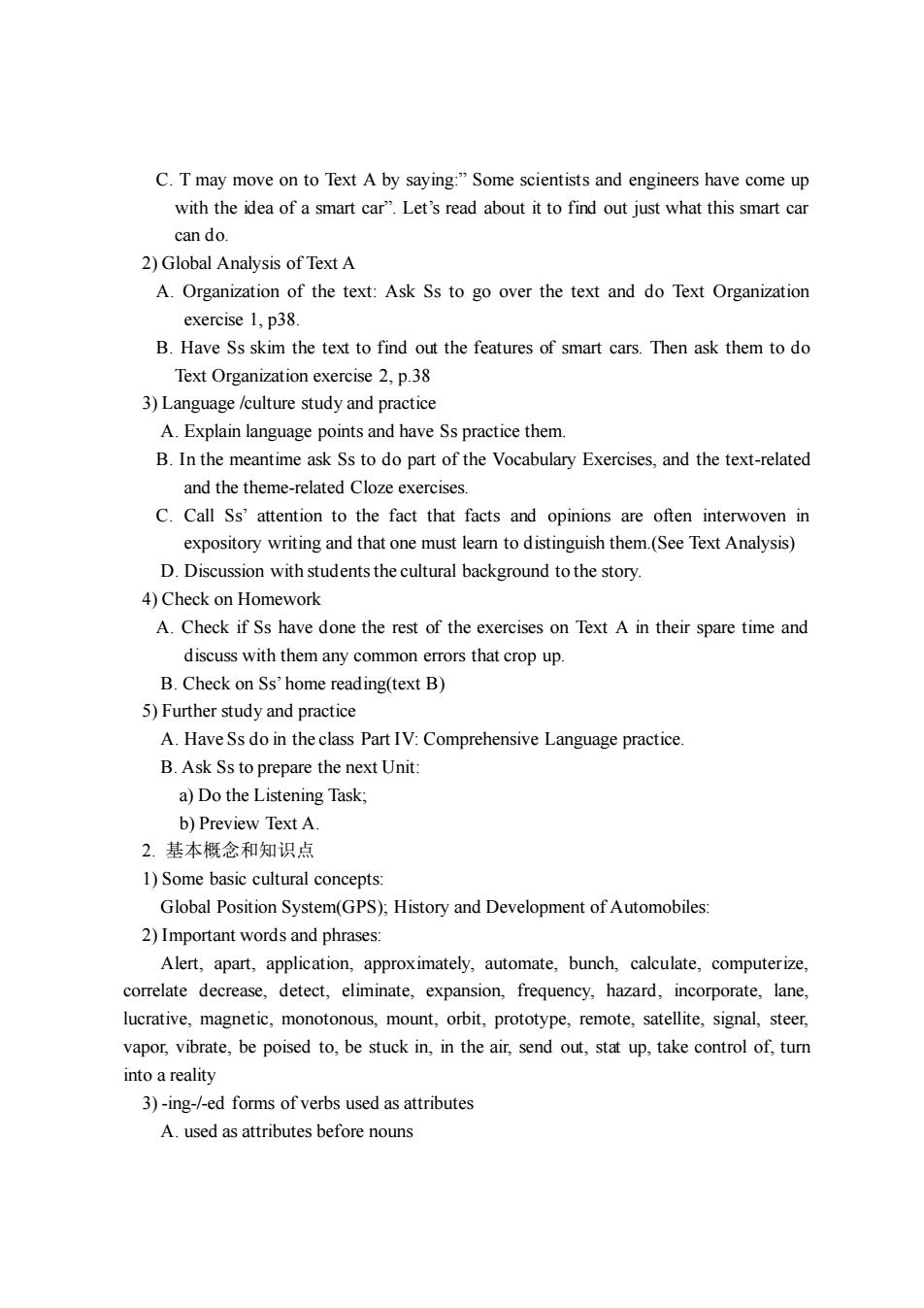
C.Tmay move on to Text A by saying:"Some scientists and engineers have come up with the idea of a smart car.Let's read about it to find out just what this smart car can do. 2)Global Analysis of Text A A.Organization of the text:Ask Ss to go over the text and do Text Organization exercise 1.p38 B.Have Ss skim the text to find out the features of smart cars.Then ask them to do Text Organization exercise 2.p.38 3)Language /culture study and practice A.Explain language points and have Ss practice them. B.In the meantime ask Ss to do part of the Vocabulary Exercises,and the text-related and the theme-related Cloze exercises C.Call Ss'attention to the fact that facts and opinions are often interwoven in expository writing and that one must learn to distinguish them.(See Text Analysis) D.Discussion with students the cultural background to the story 4)Check on Homework A.Check if Ss have done the rest of the exercises on Text A in their spare time and discuss with them any common errors that crop up B.Check on Ss'home reading(text B) 5)Further study and practice A.HaveSs do in the class Part IV:Comprehensive Language practice B.Ask Ss to prepare the next Unit a)Do the Listening Task b)Preview Text a 2.基本概念和知识点 1)Some basic cultural concepts Global Position System(GPS);History and Development of Automobiles: 2)Important words and phrases: Alert,apart,application,approximately,automate,bunch,calculate,computerize, correlate decrease,detect,eliminate,expansion,frequency,hazard,incorporate,lane. lucrative,magnetic,monotonous,mount,orbit,prototype,remote,satellite,signal,steer. vapor,vibrate,be poised to,be stuck in,in the air,send out,stat up,take control of.tum into a reality 3)-ing-/-ed forms of verbs used as attributes A.used as attributes before nouns
C. T may move on to Text A by saying:” Some scientists and engineers have come up with the idea of a smart car”. Let’s read about it to find out just what this smart car can do. 2) Global Analysis of Text A A. Organization of the text: Ask Ss to go over the text and do Text Organization exercise 1, p38. B. Have Ss skim the text to find out the features of smart cars. Then ask them to do Text Organization exercise 2, p.38 3) Language /culture study and practice A. Explain language points and have Ss practice them. B. In the meantime ask Ss to do part of the Vocabulary Exercises, and the text-related and the theme-related Cloze exercises. C. Call Ss’ attention to the fact that facts and opinions are often interwoven in expository writing and that one must learn to distinguish them.(See Text Analysis) D. Discussion with students the cultural background to the story. 4) Check on Homework A. Check if Ss have done the rest of the exercises on Text A in their spare time and discuss with them any common errors that crop up. B. Check on Ss’ home reading(text B) 5) Further study and practice A. Have Ss do in the class Part IV: Comprehensive Language practice. B. Ask Ss to prepare the next Unit: a) Do the Listening Task; b) Preview Text A. 2. 基本概念和知识点 1) Some basic cultural concepts: Global Position System(GPS); History and Development of Automobiles: 2) Important words and phrases: Alert, apart, application, approximately, automate, bunch, calculate, computerize, correlate decrease, detect, eliminate, expansion, frequency, hazard, incorporate, lane, lucrative, magnetic, monotonous, mount, orbit, prototype, remote, satellite, signal, steer, vapor, vibrate, be poised to, be stuck in, in the air, send out, stat up, take control of, turn into a reality 3) -ing-/-ed forms of verbs used as attributes A. used as attributes before nouns
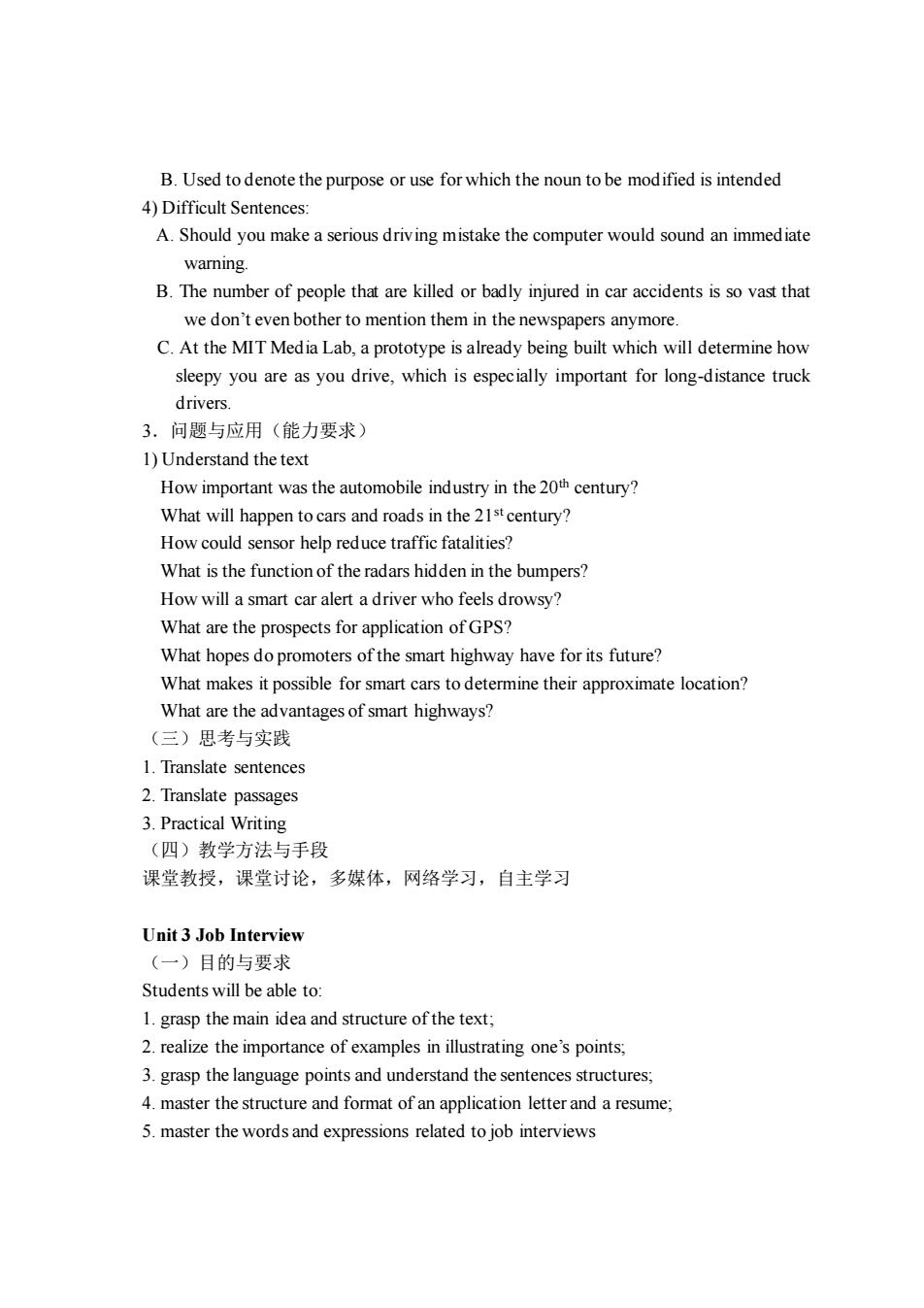
B.Used to denote the purpose or use for which the noun to be modified is intended 4)Difficult Sentences A.Should you make a serious driving mistake the computer would sound an immediate B.The number of people that are killed or badly injured in car accidents is so vast that we don't even bother to mention them in the newspapers anymore. C.At the MIT Media Lab.a prototype is already being built which will determine how sleepy you are as you drive.which is especially important for long-distance truck drivers. 3.问题与应用(能力要求) 1)Understand the text How important was the automobile industry in the 20th century? What will happen to cars and roads in the 21st century? How could sensor help reduce traffic fatalities? What is the function of the radars hidden in the bumpers? How will a smart car alert a driver who feels drowsy? What are the prospects for application ofGPS? What hopes do promoters of the smart highway have for its future? What makes it possible for smart cars to determine their approximate location? What are the advantages of smart highways? (三)思考与实践 1.Translate sentences 2.Translate passages 3.Practical Writing (四)教学方法与手段 课堂教授,课堂讨论,多媒体,网络学习,自主学习 Unit 3 Job Interview (一)目的与要求 Students will be able to 1.grasp the main idea and structure of the text; 2.realize the importance of examples in illustrating one's points. 3.grasp the language points and understand the sentences structures, 4.master the structure and format of an application letter and a resume 5.master the words and expressions related to job interviews
B. Used to denote the purpose or use for which the noun to be modified is intended 4) Difficult Sentences: A. Should you make a serious driving mistake the computer would sound an immediate warning. B. The number of people that are killed or badly injured in car accidents is so vast that we don’t even bother to mention them in the newspapers anymore. C. At the MIT Media Lab, a prototype is already being built which will determine how sleepy you are as you drive, which is especially important for long-distance truck drivers. 3.问题与应用(能力要求) 1) Understand the text How important was the automobile industry in the 20th century? What will happen to cars and roads in the 21st century? How could sensor help reduce traffic fatalities? What is the function of the radars hidden in the bumpers? How will a smart car alert a driver who feels drowsy? What are the prospects for application of GPS? What hopes do promoters of the smart highway have for its future? What makes it possible for smart cars to determine their approximate location? What are the advantages of smart highways? (三)思考与实践 1. Translate sentences 2. Translate passages 3. Practical Writing (四)教学方法与手段 课堂教授,课堂讨论,多媒体,网络学习,自主学习 Unit 3 Job Interview (一)目的与要求 Students will be able to: 1. grasp the main idea and structure of the text; 2. realize the importance of examples in illustrating one’s points; 3. grasp the language points and understand the sentences structures; 4. master the structure and format of an application letter and a resume; 5. master the words and expressions related to job interviews

6.Conduct the writing of an application letter and a resume: (二)教学内容 1.主要内容 1)Text Learing &Discussion A.Warming-up:describing a job. B.Introduction of the cultural background,the author,and the general knowledge about how to prepare fora job interview: C.Text learning:text structure,main idea,important details,difficult words and sentences 2)Application letter&resume A.The basic structure and contents of an application letter,and related useful expressions and sentence structures, B.The format and structure ofa resume and the features of resume language 2.基本概念和知识点 1)Topic sentence/theme: 2)Reading skills:skimming and scanning for the topic sentences; 3)Writing skills:use examples to illustrate one's points. 4)English application letter and resume; 5)Words&Expressions:endeavor,accidentally,inadequate,prospective,sparkle,grill, go after,follow up,in one's hands,make a difference; 6)Difficult sentences A.When we watch a world-class musician or a top athlete,we don't see the years of preparation that enabled him or her to become great B.The same preparation applies in every form of human endeavor. C.You see,a goal is a dream with a deadline:in writing,measurable,identifiable, attainable D.He's living proof that you can always shift the odds in your favor. E.As we were taxiing down it to take off.Curt tumed to me and said gleefully,"Look, Harvey,no tracks in the snow! 3.问题与应用(能力要求) 1)Reading:how to identify the theme and topic sentences by skimming and scanning: 2)Writing:how to develop a paragraph based on a topic sentence:how to support you standpoint by employing relevant examples, 3)Speaking:how todescribe one's ideal job: 4)Practical writing:How to use concise words and shorter sentences in writing a resume;
6. Conduct the writing of an application letter and a resume; (二)教学内容 1. 主要内容 1)Text Learning & Discussion A. Warming-up: describing a job; B. Introduction of the cultural background, the author, and the general knowledge about how to prepare for a job interview; C. Text learning: text structure, main idea, important details, difficult words and sentences 2)Application letter & resume A. The basic structure and contents of an application letter, and related useful expressions and sentence structures; B. The format and structure of a resume and the features of resume language 2. 基本概念和知识点 1) Topic sentence/theme; 2) Reading skills: skimming and scanning for the topic sentences; 3) Writing skills: use examples to illustrate one’s points; 4) English application letter and resume; 5) Words & Expressions: endeavor, accidentally, inadequate, prospective, sparkle, grill, go after, follow up, in one’s hands, make a difference; 6) Difficult sentences: A. When we watch a world-class musician or a top athlete, we don’t see the years of preparation that enabled him or her to become great. B. The same preparation applies in every form of human endeavor. C. You see, a goal is a dream with a deadline: in writing, measurable, identifiable, attainable. D. He’s living proof that you can always shift the odds in your favor. E. As we were taxiing down it to take off, Curt turned to me and said gleefully, “Look, Harvey, no tracks in the snow!” 3. 问题与应用(能力要求) 1) Reading: how to identify the theme and topic sentences by skimming and scanning; 2) Writing: how to develop a paragraph based on a topic sentence;how to support your standpoint by employing relevant examples; 3) Speaking: how to describe one’s ideal job; 4) Practical writing: How to use concise words and shorter sentences in writing a resume;

write an application letter and a resume based on a want ad. (三)思考与实践 1.As an university student,how are you going to prepare for your future career by making full use of the resource on and off campus? 2.Practice:a mock job interview (四)教学方法与手段 Multiple media teaching,communicative,interactive and PBL approach in classroom, role play,teamwork,discussion and video record the job interview. Unit 5 Never Judge by Appearances (一)目的与要求 Students will be able to 1.grasp the main idea of Text A: 2.appreciate how powerful contracts is in delineating a person's character. 3.master the key language points in Text A and leamn how to use them in context; 4.understand the cultural background related to the content; 5.express themselves more freely on the theme of Never Judge by Appearance after doing a series of theme-related reading,listening,speaking and writing: 6.fill out a remittance application form. (二)教学内容 1主要内容 1)Warming up A.Theme-related Listening Task B.Ranking activity a)T asks Ss at random what they think are the determining forces in shaping human nature. b)T chooses five or six determining forces.and then writes them down on the blackboard. c)Ss from groups to rank these forces in descending order of importance.They must also explain why. d)A few groups report to the class C.Text Introduction T may lead into Text A by saying:Now let's tur our attention to the text to see what Maugham has to say about human nature
write an application letter and a resume based on a want ad. (三)思考与实践 1. As an university student, how are you going to prepare for your future career by making full use of the resource on and off campus? 2. Practice: a mock job interview. (四)教学方法与手段 Multiple media teaching, communicative, interactive and PBL approach in classroom, role play, teamwork, discussion and video record the job interview. Unit 5 Never Judge by Appearances (一)目的与要求 Students will be able to: 1. grasp the main idea of Text A; 2. appreciate how powerful contracts is in delineating a person’s character; 3. master the key language points in Text A and learn how to use them in context; 4. understand the cultural background related to the content; 5. express themselves more freely on the theme of Never Judge by Appearance after doing a series of theme-related reading, listening, speaking and writing; 6. fill out a remittance application form. (二)教学内容 1. 主要内容 1) Warming up A. Theme-related Listening Task B. Ranking activity a) T asks Ss at random what they think are the determining forces in shaping human nature. b) T chooses five or six determining forces, and then writes them down on the blackboard. c) Ss from groups to rank these forces in descending order of importance. They must also explain why. d) A few groups report to the class. C. Text Introduction T may lead into Text A by saying: Now let’s turn our attention to the text to see what Maugham has to say about human nature
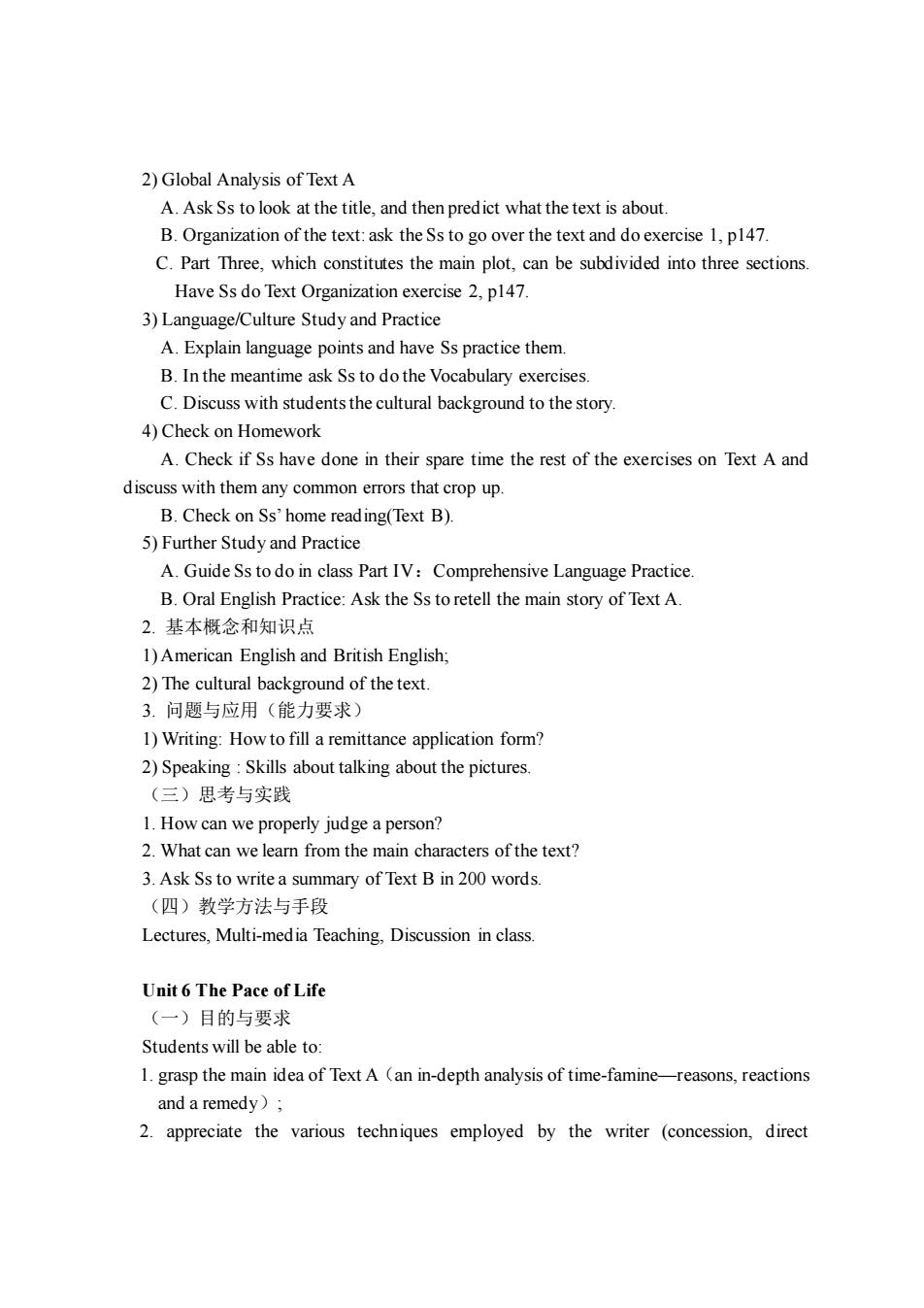
2)Global Analysis of Text A A.Ask Ss to look at the title,and then predict what the text is about. B.Organization of the text:ask the Ss to go over the text and do exercise 1,p147. C.Part Three,which constitutes the main plot,can be subdivided into three sections. Have ss do Text Organization exercise 2 p147 3)Language/Culture Study and Practice A.Explain language points and have Ss practice them. B.In the meantime ask Ss to do the Vocabulary exercises. C.Discuss with students the cultural background to the story 4)Check on Homework A.Check if Ss have done in their spare time the rest of the exercises on Text A and discuss with them any common errors that crop up. B.Check on Ss'home reading(Text B). 5)Further Study and Practice A.Guide Ssto do in class Part IV:Comprehensive Language Practice B.Oral English Practice:Ask the Ss to retell the main story of Text A. 2.基本概念和知识点 1)American English and British English; 2)The cultural background of the text 3.问题与应用(能力要求) 1)Writing:Howto fill a remittance application form? 2)Speaking:Skills about talking about the pictures. (三)思考与实践 1.How can we properly judge a person? 2.What can we leamn from the main characters of the text? 3.Ask Ss to write a summary of Text B in 200 words. (四)教学方法与手段 Lectures,Multi-media Teaching,Discussion in class Unit 6 The pace of life (一)目的与要求 Students will be able to 1.grasp the main idea of Text A (an in-depth analysis of time-famine-reasons,reactions and a remedy); 2.appreciate the various techniques employed by the writer (concession,direct
2) Global Analysis of Text A A. Ask Ss to look at the title, and then predict what the text is about. B. Organization of the text: ask the Ss to go over the text and do exercise 1, p147. C. Part Three, which constitutes the main plot, can be subdivided into three sections. Have Ss do Text Organization exercise 2, p147. 3) Language/Culture Study and Practice A. Explain language points and have Ss practice them. B. In the meantime ask Ss to do the Vocabulary exercises. C. Discuss with students the cultural background to the story. 4) Check on Homework A. Check if Ss have done in their spare time the rest of the exercises on Text A and discuss with them any common errors that crop up. B. Check on Ss’ home reading(Text B). 5) Further Study and Practice A. Guide Ss to do in class Part IV:Comprehensive Language Practice. B. Oral English Practice: Ask the Ss to retell the main story of Text A. 2. 基本概念和知识点 1) American English and British English; 2) The cultural background of the text. 3. 问题与应用(能力要求) 1) Writing: How to fill a remittance application form? 2) Speaking : Skills about talking about the pictures. (三)思考与实践 1. How can we properly judge a person? 2. What can we learn from the main characters of the text? 3. Ask Ss to write a summary of Text B in 200 words. (四)教学方法与手段 Lectures, Multi-media Teaching, Discussion in class. Unit 6 The Pace of Life (一)目的与要求 Students will be able to: 1. grasp the main idea of Text A(an in-depth analysis of time-famine—reasons, reactions and a remedy); 2. appreciate the various techniques employed by the writer (concession, direct